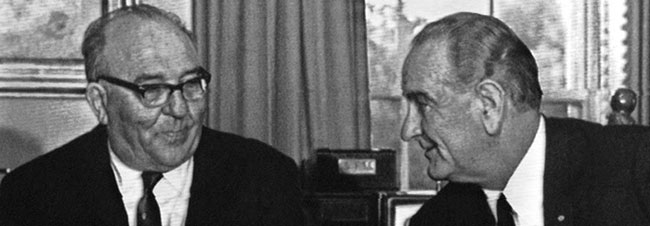Levi Eshkol, Israeli Prime Minister during the Six-Day War, with US President Lyndon Johnson
The LBJ Presidential Library was one of the sponsors at the 92nd Street Y on Sunday, April 2, 2017, of a three hour symposium entitled, THE SIX DAY WAR: A Fifty Year Retrospective. AFSI members attended the Symposium to get a handle on the larger context of the war which transformed Israeli society permanently. Although always thinking of the miraculous victories of those six days in June, when Israel regained Jerusalem, the Golan Heights, and Judea and Samaria, in terms of the enormous significance of those events for Israel, it is easy to forget the general context as it existed in the U.S.
We were reminded that it was President Lyndon Baines Johnson who was sitting in the White House, thoroughly caught up with the Vietnam war. The attempted invasion into Israel by Egypt, Jordan, and Syria presented a possible direct confrontation between America and the Soviet Union. Dean Rusk and Fred McNamara were Johnson’s primary advisers. Although it was installed four years previously, after the Cuban missile crisis, this was the first time the “hot line” between the US and USSR was used. Abba Eban was a central figure who went to President Johnson asking for help for Israel, only to be turned down.
It was Nasser of Egypt who had attempted the Pan-Arabism movement from 1948-1967. Then he closed the Straits of Tehran and declared war on Israel. The mood of the Arabs was one of complete confidence in a victory, and for the Israelis it was one of great anxiety and helplessness. The feeling of being alone, without the help of America and Europe, dominated the atmosphere. Russia’s Kosygin was leading the Cold war. Levi Eshkol was Israel’s Prime Minister. However, while the public and the politicians were worried (to say the least), many members of the IDF felt confident and ready. Once Israel destroyed Egypt’s Air Force, turned away the Syrian tanks on the Golan, and captured the Temple Mount, reuniting Yerushalayim, victory was declared. Where the U.S. had been traditionally in the Arab corner, President Johnson now declared the end of “neutrality.” The days of pro-Arab positioning would be over. Eshkol was invited to the White House by Johnson and to the summer White House. Arthur Goldberg was America’s UN representative who played a large role in the passing of UN Resolution 242, on Nov. 22, 1967, establishing the principle of “land for peace.”
The Vietnam war was still raging. Clifford Clark was vigorously against the war, along with a huge number of Americans who would take to the streets of DC protesting the war. Johnson was also dealing with many domestic issues, like the fair housing bill, which was passed only after the assassination of Martin Luther King, Jr.
Such was the turmoil of 1967.
Today, fifty years later, Russia is still a major antagonist, supporting Hezbollah, Iran’s proxy in Syria. Hezbollah has 200,000 rockets aimed at the Golan and northern Israel. The issue of the “settlements” in Judea and Samaria is still unsettled, the PA under Abu Mazen still refuses to recognize Israel’s right to exist, and Gaza is still a threat while Hamas rockets threaten the south. Once again Israel has a sympathetic U.S. President in Donald Trump, who appreciates Israel’s PM Netanyahu. America will stand by Israel, its ally in the Middle East. How will this impact on America’s relations with Russia, while at the same time Trump has to deal with a full plate of other international and domestic issues? The next six months will be very telling. Lock into your seat belts and get ready for a bumpy ride.
– AFSI Staff

